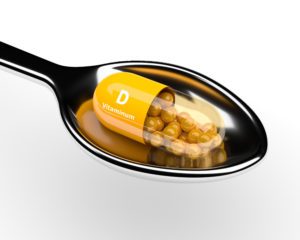
Posted 4 years ago
Vitamin D: The Cancer Fighting Vitamin

Vitamin D is actually one of the most important nutrients in the body that inhibits the development of cancer cells. Vitamin D controls many different cellular functions, from decreasing the growth of cells, promoting differentiation of cells, and lowering inflammation in the body.
All of these functions create an anti-cancer role for the nutrient. Vitamin D deficiency has been linked to colon, prostate, breast, and ovarian cancer.
So, what foods can we eat to get this vitamin? A few foods like fatty fish provide some vitamin D, but the majority of this vitamin is manufactured in the body.
Vitamin D is produced when sunlight hits the skin, but with modern day lifestyles, a majority of people have deficient or suboptimal levels of Vitamin D, even in sunny Arizona.
The amount of vitamin D that is synthesized with sun exposure varies by a person’s age and skin pigment. As you age, your skin becomes less efficient at manufacturing Vitamin D.
Also, the darker the pigment of your skin, the less vitamin D it will manufacturer. The kidneys and liver also play a role in activating the vitamin, so the health of these organs can also influence your level of Vitamin D as well.
So how much vitamin D should a person take to make sure they are not deficient? Since there are so many factors that influence a person’s vitamin D level, it is best to have your vitamin D level checked with a simple blood test known as 25(OH) vitamin D (total).
Most people agree that a normal vitamin D level is between 30-100ng/ml, but there is some debate what the optimal number should be. I generally recommend that my patients get their level somewhere been 40-70 ng/ml.
Vitamin D is best replaced with the active form, which is vitamin D3. Prescription Vitamin D is generally Vitamin D2 which is not as biologically available. Since it is a fat-soluble vitamin (as are vitamins E, A, and K), it can be stored in the body, which means you can take it either daily or once weekly. It is also best to take your Vitamin D with a meal that contains a little bit of fat to improve absorption.
If you are deficient in vitamin D, it may take up to 10 months to fully replace your stores. For individuals that are deficient, under a doctor’s supervision, it is recommended to take somewhere between 5,000 to 10,000 IU daily for a few months and have levels rechecked within 3 months.
Once your vitamin D level is at an optimal level, most people will need to supplement with 2,000 IU to 4,000 IU a day to maintain good levels.
Do you know what your vitamin D level is? If you don’t, it is a good idea to have your level checked with a routine blood test.
Keeping your Vitamin D level up could make a big difference in lowering your risk of developing cancer as well as many other illnesses.
About Heidi Rula, M.D.
Medical Director of the Supportive Care Services Department
Dr. Heidi Rula joined Ironwood in 2018 to launch the Integrative Oncology program. She is board certified in family medicine and fellowship-trained in Integrative Medicine. Dr. Rula has been a practicing physician in the Phoenix area for approximately 20 years and has been recognized by her colleagues as one of Phoenix’s “Top Doctors” on multiple occasions.
Dr. Rula has played a key role in bringing integrative medicine to the Valley. She served as the medical director of the University of Arizona Integrative Health Center, where she leads a team of physicians and complementary practitioners in a unique model of integrative primary care that she helped to develop along with Dr. Weil and the UA Center for Integrative Medicine.
About Ironwood Cancer & Research Centers
Ironwood Cancer & Research Centers (ICRC) is the largest multi-specialty oncology network in the Greater Metro Phoenix area. They have over 100 medical providers, a robust Integrative Services program, and a dedicated clinical research department. Ironwood Cancer & Research Centers has 15 valley locations and five comprehensive cancer care centers that offer a multi-disciplinary approach for expedited personalized patient care. For more information, please visit www.ironwoodcrc.com.



 About
About